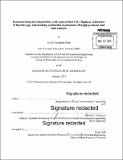Demonstrating biocompatibility with supercritical CO₂ : biphasic cultivation of Bacillus spp. and probing acclimation mechanisms through proteome and lipid analysis
Author(s)
Peet, Kyle Creighton
DownloadFull printable version (15.95Mb)
Other Contributors
Massachusetts Institute of Technology. Department of Civil and Environmental Engineering.
Advisor
Janelle R. Thompson.
Terms of use
Metadata
Show full item recordAbstract
Supercritical (sc) CO₂ usage is increasing globally with applications as a sterilizing agent, as a non-toxic solvent, and as the form of the greenhouse gas CO₂ injected underground for geologic carbon sequestration (GCS). In this thesis I have described the isolation of microorganisms from three different carbon sequestration pilot sites through a novel method of successive scCO₂ enrichments. I show that microorganisms of the genus Bacillus, including GCS site isolates, are resistant to the bactericidal properties of scCO₂ , and can germinate and grow in an aqueous phase incubated under scCO₂ (Chapter 2). Bacterial resistance to scCO₂ challenges the efficacy of scCO₂ based sterilization and indicates that microbial activity may be harnessed in engineered environments containing scCO₂ (e.g. biochemical catalysis involving scCO₂ as a solvent or biofilm/biomineralized barriers to scCO₂ leakage from GCS sites). In an effort to understand the physiology of acclimation to scCO₂, I have sequenced and analyzed the genomes of two GCS-site isolates, B. cereus MIT0214 and B. subterraneus MITOTI (Chapter 3). I have used genome-enabled analysis of the proteome combined with analysis of membrane lipids to ask whether cellular macromolecules are differentially represented in cells grown under different headspace and pressure conditions including CO₂ and scCO₂ (Chapters 4). In this chapter I have examined the following three hypotheses regarding the mechanisms employed by Bacilli to resist scCO₂ : (1): Resistance to CO₂ stress is governed by a similar response as acclimation to low pH stress. (2): Cell wall and membrane alterations promote bacterial growth under scCO₂ by modulating the cell's microenvironment. (3): Global expression of proteins mediating cellular homeostasis in viable but non-growing (stationary-phase) populations acclimated to scCO₂ resembles a generalized profile of anaerobic growth, with notable exceptions of individual protein(s) that mediate acclimation. The results from this thesis enhance understanding of bacterial resistance to scCO₂, enabling improved strategies for scCO₂-based sterilization and accelerating biotechnological applications of scCO₂-biocompatible organisms.
Description
Thesis: Ph. D. in Environmental Biology, Massachusetts Institute of Technology, Department of Civil and Environmental Engineering, 2015. Cataloged from PDF version of thesis. Includes bibliographical references (pages 136-152).
Date issued
2015Department
Massachusetts Institute of Technology. Department of Civil and Environmental EngineeringPublisher
Massachusetts Institute of Technology
Keywords
Civil and Environmental Engineering.